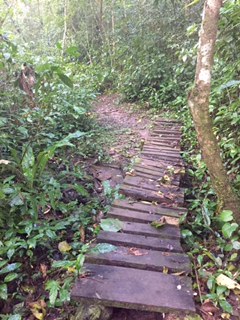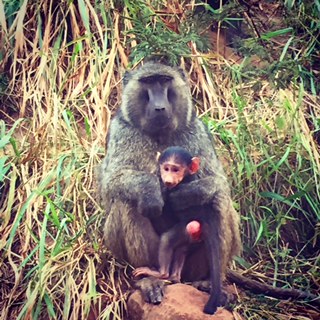Week Seven: Hiking in Mabira Forest and Traveling to Northern Uganda
Last week began with a visit to Mabira Forest, a rainforest area covering about 120 square miles between Kampala and Jinja. Although Mabira is a protected area, local residents are allowed to gather traditional herbal remedies from the forest, sugarcane, and other natural resources found within Mabira’s borders. Our guide explained that because few people still use traditional remedies, instead opting for clinics and other medications, there is little risk that the forest’s resources will be decimated. He pointed out malarial remedies, plants for upset stomachs, and a few cacao trees. Cacao trees are traditionally found in South and Central America so their presence in Mabira provides evidence of previous settlement within Mabira, prior to its designation as protected land.
Kampala is a relatively large city with a lot of noise and air pollution, specifically during peak travel times. Taking a brief trip outside the city and getting to spend a few hours walking around the “urban forest,” as our guide referred to it, was a wonderful way to spend a Sunday. Although you could hear the highway in the distance (a main road from Kampala to Jinja intersects the forest), it provided a wonderful respite from city life.

On Tuesday, I traveled with SAFE to Gulu, in northern Uganda, for another conflict monitor training. Gulu and surrounding areas in northern Uganda were the site for much of the fighting between the Ugandan army and the Lord’s Resistance Army. The route to Gulu from Kampala brought us through the town of Karuma, once the border between land controlled by the UPDF and the LRA. One of my colleagues, who spent many years working in Northern Uganda with the American Red Cross, explained that during the more than two decades of the LRA insurgency, anyone attempting to travel to Gulu would stop in Karuma where the Uganda police would decide who could and could not proceed. Further, if you arrived in Karuma around nightfall, you had to remain in the town for the night, only able to complete your travel during daylight hours. As we passed through Karuma, remnants of its position as the border between relative peace and war were apparent. Guns facing northward still look out from above the Nile and “Police Checkpoint” signs dot the roads. There were a number of military personnel along the roads, however, that most likely was more to do with an appearance by President Yoweri Museveni in Gulu earlier in the day.
As we were discussing the legacy of the north and observing the visible remains of the LRA conflict, we rounded a corner and came across a number of baboons along the roadside. As the only foreigner in the car, I acted as one may expect, by making audible noises of my delight at seeing baboons in the wild! My car companions were very nice and accepting of my over-exuberance at seeing any sort of monkey outside of a zoo. We slowed, took quite a few pictures, and enticed a mother baboon and her child closer to the car by throwing some cassava we had purchased earlier at a roadside market. For me, it was incredible. I later learned that those baboons know that they can get food from passerby and will remain near the road during the dry season. If we had passed during the rainy season, when food was plentiful, we most likely would not have seen any baboons.

Uganda is an unbelievable place. One minute we’re speaking of violence and conflict, the next I’m mere feet away from wild baboons. Further, the people that attended the conflict monitor training were extremely intelligent and informed about conflict issues in their area and Uganda as a whole. They all had a true desire to work to help their communities overcome the two decades of violence. Many participants were young, meaning they had spent the majority of their lives growing up amidst the conflict, potentially living in camps established for internally displaced people. Yet, with such a history, every single person there was enthusiastic, bright, and eager to work with SAFE. The people that I had the pleasure to meet in Gulu were wonderful examples of the welcoming and hospitable nature of Ugandan people.